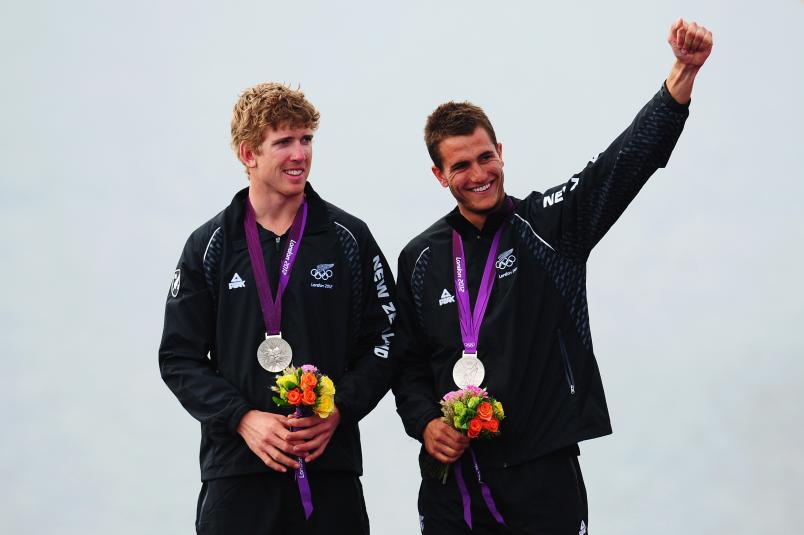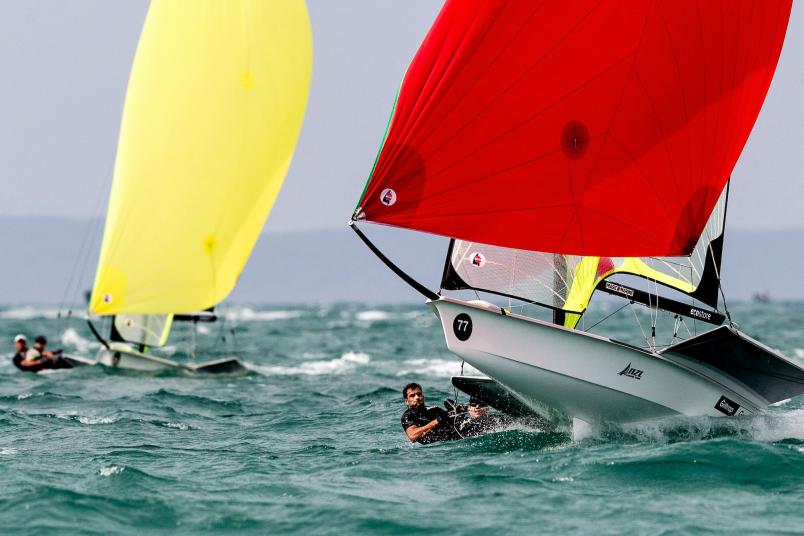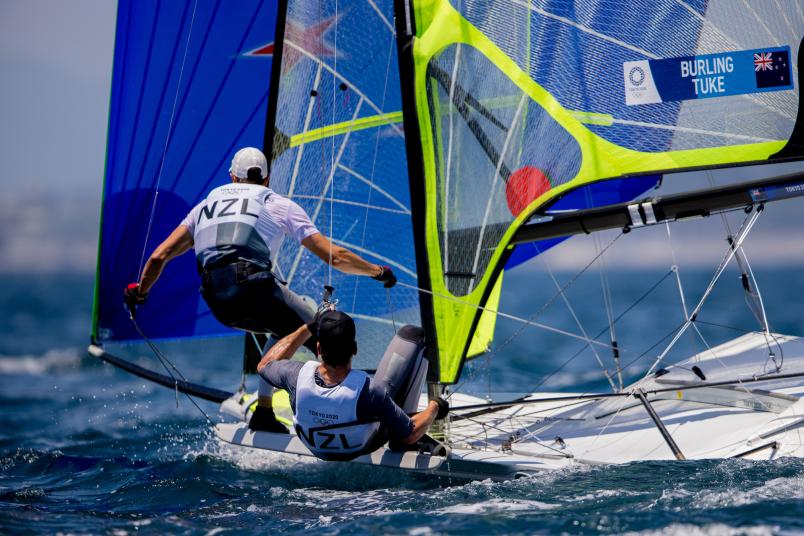Peter Burling and Blair Tuke recently announced that their busy schedules means they won't be chasing a fourth medal at the 2024 Paris Olympics, prompting Michael Brown from Yachting New Zealand to catch up with them to reflect on their incredible partnership in a 49er.
Blair Tuke still remembers the first time he saw his name etched on the inside of a beer bottle cap.
A brewing company puts sports trivia questions on their bottle caps and, in this instance, asked which athletes won New Zealand’s 100th Olympic medal.
That honour fell to Peter Burling and Tuke with their silver in the 49er at the 2012 London Games, a result which announced their arrival to the wider New Zealand public. It’s fair to say, 10 years on, they are the answers to an abundance of trivia questions.
In Olympic class sailing alone, they accumulated six world 49er titles together, three Olympic medals and countless other continental, World Cup and national titles. They were also named World Sailors of the Year – Burling also picked up the gong in 2017 – and were the most dominant combination in modern Olympic sailing.
We might never see anything like that sort of pre-eminence again, and certainly won’t see it from Burling and Tuke in a 49er again in the near future.
The pair announced recently they had re-signed with Team New Zealand for the next America’s Cup. The timing of that Cup defence, together with their ongoing commitments with the New Zealand SailGP Team (they’re sailors and joint CEOs) and their environmental charity Live Ocean, makes it impossible for them to chase a fourth medal at the 2024 Paris Olympics. They haven’t officially retired from 49er sailing, saying “never say never”, but the chances are exiguous.
“Those things mean we really have our hands full again and we just didn’t feel we could give the Olympics the time and energy they deserve or require,” Tuke told the Yachting New Zealand podcast, Broad Reach Radio. “It was a pretty tough decision when it’s been such a big part of your life but we have some awesome memories to reflect on and you never know where it will go in the future. We’re definitely keeping our options open but we’re firmly in place with Team New Zealand and SailGP over the next couple of years.”

Burling and Tuke celebrate their silver medal at the 2012 London Olympics.
There was a time when Burling and Tuke didn’t always have so many balls to juggle.
Burling was 17 and fresh from competing in the men’s 470 at the 2008 Beijing Olympics when he emailed the 19-year-old Tuke asking him if he was interested in teaming up in a 49er.
The contents of that email exchange now sit on display at the Maritime Museum, illustrating the significance of their partnership.
They were on the water within two weeks of Burling returning from Beijing and went through what Burling describes as a “feeling out period”.
“When we first started talking, it was about whether we could get good enough to have a crack at the Olympics and win an Olympic medal for the country,” he explains.
They were relatively content with their results in the first couple of years, with gear failure seriously hampering their efforts at their first world championships together in 2009. They finished 26th that year and backed that up with 17th the following year in the Bahamas.
“That was probably one of the lows of our 49er career because we thought we were a little bit hard done by in the first worlds,” Burling says. “We had learned a lot since then and, at that stage, there was quite a harsh funding crossover – getting in the top 16 – so to miss that by one place was pretty tough.
“That was probably one of the big reasons we managed to get second at that next worlds [in 2011] because it really made us go back and take a good, hard look at ourselves. Did we want to dig a bit deeper and give it everything we had and try to make a big step forward?”
The answer was an emphatic ‘yes’.

Their win in Auckland in 2019 is the most cherished of their six world titles. Photo: Sailing Energy.
It’s widely acknowledged Burling and Tuke are pretty laidback customers but it’s less well known how meticulous they are when it comes to planning and details.
As long-time coach Hamish Willcox says: “There’s an incredible intensity about Pete and Blair that only a very few people are aware of. They go so hard and so fast at so many things at the same time.
“I remember our first meeting [when they asked me to coach them] and they were incredibly clear about what they wanted. I was impressed from the start.”
Others were less impressed in the early days.
Nathan Handley, who went on to coach Jo Aleh and Polly Powrie to Olympic gold and silver medals in the women’s 470, was Burling and Tuke’s first coach and said they were “hopeless” when it came to campaign planning.
Tuke chuckles when reminded of a meeting they had with Handley and long-time campaign advisor David Slyfield after the 2010 world championships.
“Sly was considering whether to work with us and I think this other guy [from High Performance Sport New Zealand] advised Sly not to because we were these hopeless guys,” he explains. “I think Pete turned up with a pen and I had a piece of paper so between us we had something to write some notes but something in that meeting caught Sly’s attention and he gave us another chance.
“There were definitely stages when we were still maturing and didn’t have the processes in place. That took some good people to come around us and help funnel that energy. But we were always really ambitious and striving to be better people and better sailors so that was always there.”
They also formed a training relationship with the Australian 49er squad, including Nathan Outteridge and Iain Jensen who at that time set the standard in the 49er, and made significant improvements to the point Burling and Tuke were second behind the Aussies at both the 2011 and 2012 world championships.
They transferred that form into the London Olympics, again finishing second behind Outteridge and Jensen but well ahead of third, and then set about figuring out how to go one better four years later at the Rio Olympics.
“That whole 2012 campaign was about learning as quickly as we could and, if you look back at the beginning of that campaign, we were miles off where we needed to get to at the end,” Burling says. “It really was a scramble.
“After that it was a good opportunity to take stock over what we had actually done over the last period but also plan how we wanted to go about really dominating that next cycle. That was really our goal, to go out in those first couple of events and put our best foot forward early and just keep improving.”
No one really knew just how dominant they would become.

Leading the New Zealand team into the stadium at the 2016 Rio Olympics. Photo: Sailing Energy / World Sailing.
Burling and Tuke won the first of their six world titles in Marseille in 2013 and won every event in that four-year cycle except a shortened pre-Olympic regatta in Rio, when they were third. They had often wrapped up a title well before the medal race and at one event in Rio in 2014 still won despite missing the entire first day of racing due to the fact they had been attending the World Sailor of the Year Awards in Spain.
“We were kind of in cruisy mode when we got there, thinking we’d probably miss two days and do the last two days but while rigging the boat it became apparent we could make the second day and started scrambling a bit more,” Tuke remembers. “We went out there and managed to sail a pretty good regatta and took it out after carrying 52 points [on our scorecard for the races we missed]. That was classic and something we will certainly remember for a while.”
It probably added to the building aura surrounding the pair. They aren’t sure if other crews were intimidated by them but Willcox is, comparing their standing with that of Sir Ben Ainslie who dominated Laser and Finn sailing for so long in the 1990s and 2000s and remains the most successful sailor in Olympic history with five medals, including four gold.
It meant Burling and Tuke went to the Rio Olympics with everyone, including the New Zealand public, expecting them to win. That pressure was amplified when they were named joint captains of the New Zealand Olympic team and led the Kiwi athletes into the opening ceremony.
“That was an amazing experience,” Tuke says. “Both of us would probably say it was one of the proudest moments of our lives to lead the New Zealand team into the Maracana Stadium. It was so special.
“That was five or six days before we raced so, if anything, that probably helped us. We had that big buzz of dealing with all of that and then we could concentrate on the job at hand. There was pressure and the people who have carried the flag haven’t necessarily had the best record but I think we just used that as the kickstart for us to get into our work. It was a moment we will treasure forever.”
So was winning Olympic gold.
The result was never really in doubt and they went on to win by 43 points, the largest winning margin in Olympic history since the present scoring system was introduced in the late 1960s. They wrapped up gold with two races to spare and even afforded themselves time to watch a little of Aleh and Powrie’s medal race immediately before their own – which they duly won anyway.
“I think both of us really enjoy that challenge of performing when it really matters,” Burling says. “I think we both tend to perform a little bit better when we have to.
“One of the really enjoyable things was all that planning came together and we probably sailed one of our best ever events. It was such an amazing event for us.”

Burling and Tuke competing at their third Olympics together last year. Photo: Sailing Energy / World Sailing.
Hamish Willcox didn’t think Burling and Tuke would be back for another crack at the Olympics, so set about following his ambition of sailing around the world with his wife.
He had to amend those plans when Burling and Tuke outlined their intentions to him during their own journey around the globe in the 2017/18 Volvo Ocean Race. The lure of trying to win a third Olympic medal was too hard to ignore, despite their growing list of commitments.
They were seventh at their first international regatta in Palma and third a couple of weeks later in Genoa before winning both the European championships in Weymouth and Olympic test event in Enoshima. Victories at both the 2019 (Auckland) and 2020 (Geelong) world championships saw them named in the New Zealand team to compete at the Tokyo Olympics.
And then Covid hit.
“It definitely made for a pretty interesting 2021,” Burling says in his understated way. “We had been pretty happy with where we were at, coming off the back of two world championship wins, and were pretty excited to get in and race at the Olympic Games so we could then focus on the America’s Cup 100 percent after that.
“Like with everyone in the world, Covid flipped everything on its head.”
It meant they had to pack their 49er away for the best part of nine months and almost restart again at the conclusion of the America’s Cup.
Normally they would race regularly to regain their sharpness but few regattas were being held, meaning they relied heavily on the strong New Zealand 49er squad to push them in training.
“By the time we went to Tokyo, I think we would say we felt ready,” Tuke says. “We had given it a huge push.”
They scrapped for every point at a hot and tricky venue in Enoshima and went into the double points medal race with a slim lead over the British combination of Dylan Fletcher and Stuart Bithell.
They “nailed the start” and won the right-hand side of the course. The only problem is the left paid, but they were still in gold medal position until the final few metres of the race when Fletcher and Bithell got their bow in front of the Germans to win the race and, ultimately, the gold on countback.
It would be natural to reflect on all the moments earlier in the regatta when one point here or there could have made a difference but neither look back on that result as the one that got away.
“I don’t think so,” Tuke says. “We got ourselves into a chance of winning in the medal race and it just wasn’t quite to be. I think we are still incredibly proud. It’s an Olympic medal and we’ve loved the journey the whole way.”
It’s hoped it’s not the end of their Olympic journey and they’re still young, being in their early 30s.
There are plenty of examples of ‘older’ sailors competing at the highest level, including Argentina’s Santiago Lange who won gold in 2016 in the Nacra 17 when 56, and five-time Olympic medallist Robert Scheidt was 47 when he competed in the ILCA 7 (Laser) at last year’s Tokyo Olympics.
But few have quite as many commitments as Burling and Tuke and they will have plenty of options over the next few years.
It’s inevitable they will continue to create history, which also means they will carry on being answers to numerous quiz questions.
- You can find the full podcast after 4pm on Friday, March 18 here.



